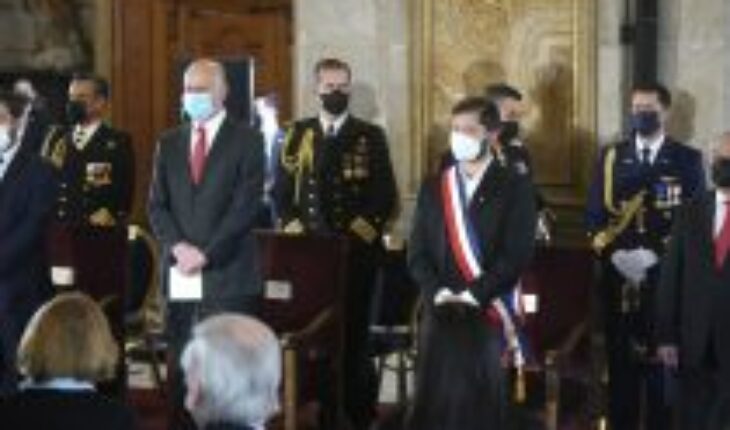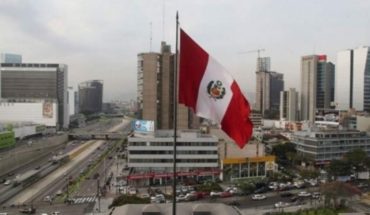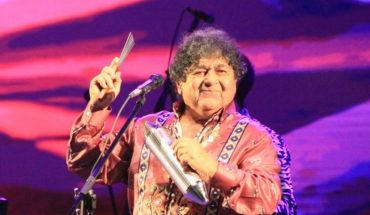President Gabriel Boric, when returning to La Moneda from the Cathedral -in the traditional Ford Galaxie- assured that there is an idea that was left “going around”. “In order to build a country, and to be able to meet again as a society, we need to be able to listen to each other. And that is something that I rescue both from the words of yesterday in Puente Alto (Te Deum Evangélico), and those of today in the Cathedral”.
“We bear fruit only when we are united with Chile. And to be united with Chile (…), the first thing we have to do is respect the opinion of those who think differently and find spaces to advance in differences. Not being fanatically clinging to one’s own ideas. But listen to what is good in those who have another point of view. I think that’s something that in recent times in our country has been weakened, and it’s something we have to recover,” the president added.
The keys to the discourses of religious figures
The Cardinal of the Catholic Church, Celestino Aós, described the country’s current context as “challenging and beautiful times.” “Injustices, problems and dissatisfactions led us to the social outbreak of October 18, 2019, we had since November 15 the process to change the Constitution, the election of a new President, the vaccine and the fight against Covid,” he outlined.
“There is violence, organized crime, economic insecurity, poor health care, bad relations and altered coexistence,” he said and in this scenario called on the authorities to seek agreements: “A series of problems that leaders and rulers must know and work to solve possible conflicts with dialogue and collaboration.”
“Violence does not build (…). Nor do the corrupt build. (…) We must work together, wrapped in joy and hope. We cannot turn the other who does not think like us into an enemy. The people voted in the plebiscite, and it is bad to violate through insults and threats to those who voted in one way or another,” he added.
Rabbi Eduardo Waingortin, for his part, described that “in this new anniversary of the homeland we face the pain of seeing our citizenry polarized and confronted.” In this way he asked for peace in the country, and called for humility to promote dialogue and leave behind pride.
He said that “peace is built and promoted with dialogue, from humility, with empathy, with cordial and friendly treatment, and with a conduct that exalts democracy and the republican spirit.” While “the destruction of peace is promoted with disqualification, the lack of condemnation of all kinds of violence, or its justification. And the arrogant attitude of believing themselves to be bearers of the only truth. Humility, humility builds peace. Pride destroys it.”
From the Muslim community in Chile, its representative and imam – the person in charge of conducting the prayers in the mosque and who acts as a guide in the prayers – also called for peace and the re-establishment of dialogue. “The Muslim community rises for the re-establishment of friendship between Chileans (…) making our enriching differences a means to work in harmony, to make Chile a prosperous country,” he said.
The reflection of political actors
Cardinal Celestino Aós during the ceremony said that “the number of people who got involved by voting in the plebiscite is a strong fact. But political participation does not end or end there. Lay Christians must be involved in politics, because it is an extensive form of charity, as it is concerned with the common good. The authorities are responsible for promoting the common good and that is why they must promote the culture of dialogue and encounter.”
Words commented by the mayor of Santiago Irací Hassler (PC). “I heard a call for us to get involved as Chileans in life together. And that also means being part of politics, of decisions. And particularly now in the search for a constituent process that unites us as a country.”
For his part, the president of the Chamber of Deputies, Raúl Soto, anchored the Church’s call to the constituent process: “I join that call, it is time to reconcile, it is time to move forward together. We have a historic opportunity to build a better Chile. We cannot go wrong in the decisions we make this time.”
“May reconciliation come, may we overcome these festivities and may collectively build an ac from there.”This allows us, on the one hand, to generate the bases for a new constituent process, but on the other, also to respond to the social urgencies that citizens have in terms of security and economic,” he added.
These words come in the midst of the pause that Chile Vamos -UDI, National Renewal (RN) and Evópoli- gave last Thursday to the talks that are being carried out between the parties with parliamentary representation to agree on a design that elaborates a new Constitution. A fact provoked, as explained by the heads of the center-right parties, by the words of government ministers, such as Vallejo and Carolina Tohá, of the Interior, which they interpreted as a “pauteo” of the talks to hurry up the agreements on a new Magna Carta.
Specifically, Chile Vamos sent a letter to the president of the Upper House, Álvaro Elizalde (PS), asking: reschedule the meeting that was scheduled for last Thursday at 9 am for next Friday, September 23; that the composition of the body be reconsidered, that is, that there be a proportionality of attendees according to the representation that each party has in Parliament, and that no representation of the Executive attends the dialogue instance.
Deputy Raúl Soto asked the government “to understand that the leading role (of the conversation about the continuation of the constituent process) is based in the National Congress, not in La Moneda.” However, he assured that since the co-legislator government is the Minister Secretary General of the Presidency, Ana Lya Uriarte, must be involved in the talks.
Senator Evópoli Luciano Cruz Coke assured that “the dialogues continue. We must see the best way to move forward with a constitution that unites us all, learning from the process that has just ended and that will also give us certain lessons from at least understanding that we have to not repeat old mistakes and give the country a Constitution that allows progress and that lasts hopefully 40 or 50 years. ”
The president of the PPD, Natalia Piergentili said that “it is important that we can sit down to talk with the differences we have between the different political blocs, but always thinking about how to enable this citizen constituent process.”
“I think that the limits that were already set on November 15 may exist and other borders can be established, but the constituent power that is going to be constituted for a new constitutional discussion cannot be limited to the extreme,” he added.
Piergentili was referring to one of the ideas that is gaining strength in the parties of Chile Vamos where they are reaching common guidelines for the next meeting on constituent design between parties with parliamentary representation. For now, they are directing their proposal to set margins for discussion before a new Constitution begins to be drafted, such as: a unitary country, in order to avoid the concept of plurinationality; that the autonomy of the Central Bank and two symmetrical chambers for the political system be recorded, among other limits.
Follow us on





